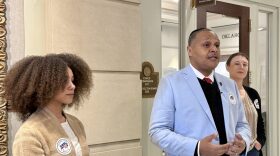San Nguyen stands along Classen Blvd. in Oklahoma City’s Asian District and points out some of the Vietnamese-owned businesses north of NW 23rd Street.
“We have the hair salon. We have the massage center. We have the chiropractice,” Nguyen said. “We have a lot of Vietnamese restaurants that go up here to 36th.”
The Obama administration plans to resettle 10,000 Syrian refugees next year, but Republicans have opposed the move, saying the Syrians present a security hazard. Few Syrians have been settled in Oklahoma, but after the end of the Vietnam War four decades ago, a wave of refugees arrived in the state.
Nguyen walks into a restaurant and orders tea and a big, steaming bowl of pho – a soup of beef broth and noodles with vegetables and meat. It’s a popular dish in Oklahoma City, first brought here by Vietnamese refugees in the 1970s after the communist government of North Vietnam captured Saigon.
Nguyen worked as a part-time translator for the U.S. Embassy in Saigon. His job put his life in danger after Saigon fell, but it also gave him the means to get out of Vietnam. He was airlifted by helicopter from the U.S. embassy roof. His wife and two children had escaped Vietnam a couple weeks earlier.
“I could not have anything with me except only empty hands with some paper, my papers,” Nguyen said. “I could not take anything out with me.”
He reunited with his family at Fort Chaffee in Arkansas and, within a couple of weeks, he earned a position with Catholic Charities. His job: To find sponsors for Vietnamese refugees in Oklahoma City.
“I am the first one to come here to get a job like that,” Nguyen said. “And also I am the first one to be naturalized.”
He said he helped resettle nearly 7,000 Vietnamese families in Oklahoma City -- a refugee community that helped transform the area now known as the Asian District, centered around Classen and NW 23rd.
Nguyen, who studied law in Vietnam, later went to work as a deputy court clerk in the U.S. District Court in charge of new citizen naturalization and new attorney admission. He is also a Catholic deacon for the Oklahoma City Archdiocese, and ministered in prisons for 20 years.
Bob Blackburn, the executive director of the Oklahoma Historical Society, said the Vietnamese newcomers helped reshape a dying part of Oklahoma City.
“Whereas much of the country was mired in hyperinflation, high gas prices, a recession, here in Oklahoma things were better than most,” Blackburn said.
Blackburn said Oklahoma City was a good place to find work in the 1970s, but its inner city was struggling. Developments were springing up to the north and south of the city, and school desegregation led to white flight to the suburbs. The opportunity for jobs, affordable housing and the low cost of living attracted Vietnamese refugees.
“They helped fill the gap that was left by the retreating middle class white population,” Blackburn said.

Many of the refugees were educated, like Nguyen. Blackburn said they helped stabilize a declining neighborhood.
“They are not a burden on the majority population,” Blackburn said. “They are moving into areas that others had abandoned and they are contributing to this vitality a lot of good restaurants, a lot of good bakeries. New attorneys, new physicians, dentists, doctors.”
Sitting at his dining room table, Vinh Nguyen looks through a few reminders of his time in Vietnam, like his military identification card when he was a lieutenant colonel in the South Vietnamese Army.
“When I left, the communists behind me were shooting at me. But I escape on the boat on the Saigon River to the ocean,” Vinh Nguyen said.
He was one of the so-called “boat people” who fled Vietnam. He spent 36 hours at sea with 30 other people on a small boat before he was picked up by the U.S. Navy’s Seventh Fleet. He ended up in refugee camps in Guam and Camp Pendleton before he got a sponsor in Oklahoma City. He later earned a degree in computer science and worked as a computer analyst for the Internal Revenue Service.
Vinh Nguyen, no relation to San Nguyen, said the area now called the Asian District was poor when he arrived in the mid-1970s and full of old, empty houses.
“We’re growing and we doing business over there, and now the Classen area is flourishing now. If without the Vietnamese, believe me, the Classen area would die,” Vinh Nguyen said.
Vinh Nguyen never really considered leaving Oklahoma City. Other large Vietnamese enclaves in the United States, like in California, are too expensive and there aren’t as many jobs.
“I think Oklahoma is a good place to live. I like it here. I love it here,” he said.
He might visit Vietnam again if the communist government loses power. But for now, he’s comfortable in his adopted home and he is happy to call himself an Okie.
KGOU relies on voluntary contributions from readers and listeners to further its mission of public service to Oklahoma and beyond. To contribute to our efforts, make your donationonline, or contact ourMembership department.








